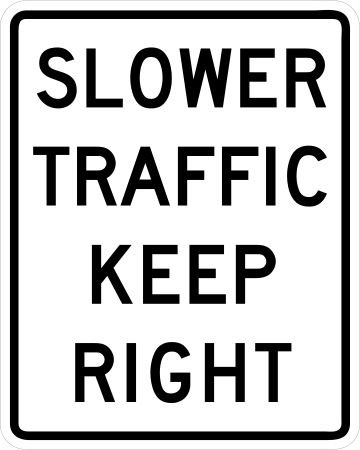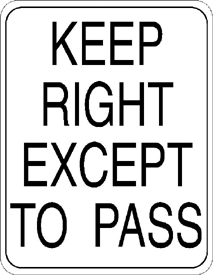Something each and everyone of us is guilty: subjectivity.
 For example, when you're flying down almost any freeway in the United States you will come across the sign, “Slower Traffic Keep Right.” I'm here to tell you, friends, that the man who thought THAT was the right sign was an idiot. Because it's subjective. NO ONE believes they are slower traffic. Everyone is certain they are moving at exactly the right speed. And if you're going faster than me? Well, you're just an ________! (Insert your favorite hostile driving expletive here.)
For example, when you're flying down almost any freeway in the United States you will come across the sign, “Slower Traffic Keep Right.” I'm here to tell you, friends, that the man who thought THAT was the right sign was an idiot. Because it's subjective. NO ONE believes they are slower traffic. Everyone is certain they are moving at exactly the right speed. And if you're going faster than me? Well, you're just an ________! (Insert your favorite hostile driving expletive here.)  Compare that to the sign, “Keep Right Except To Pass.” No judgements, no labels. We don't care who you are or what you drive, keep right. Instructional.
Compare that to the sign, “Keep Right Except To Pass.” No judgements, no labels. We don't care who you are or what you drive, keep right. Instructional.Here's another example. When you visit a doctor in the great state of California – just a routine visit – you'll be asked to fill out a questionnaire. You know, do you exercise? Do you eat right? On it is the question:
How much do you drink?
a) never
b) 1 – 2 drinks a month
c) 1 – 2 drinks a week
d) 1 – 2 drinks a day
e) more than 2 drinks a day
If you visit a doctor in the great state of Louisiana – just a routine visit – you'll fill out a similar questionnaire. On it is the question:
How much do you drink?
a) I never drink
b) I'm an occasional drinker
c) I'm a social drinker
d) I'm a steady drinker
e) I'm a heavy drinker
 Notice the difference? The first question is quantitative. No labels. No guess work. No “misunderstanding the question.” It's a number. The second question is subjective. You have to emotionally decide which label defines you accurately. Your friend might believe he's a “social drinker” and you might think, “Dude, I've never seen you without a beer in your hand – and we car pool together!”
Notice the difference? The first question is quantitative. No labels. No guess work. No “misunderstanding the question.” It's a number. The second question is subjective. You have to emotionally decide which label defines you accurately. Your friend might believe he's a “social drinker” and you might think, “Dude, I've never seen you without a beer in your hand – and we car pool together!”Subjectivity can be used to validate almost anything. Stephen Colbert called this “truthiness”, when your gut tells you what's right. It's rarely fair.
Years ago, in another life, I trained to be a body builder. I pumped iron, I did the cardio, I did the diet ... but I never got onto the stage. Somewhere along the journey I realized that the competitions were (say it with me!) subjective.
If they wanted to see who was the strongest, they'd ask the competitors to do some simple exercises in a gym. If they wanted to see who was the leanest, they'd use calipers and do a pinch test, or dunk us in water tanks. If they wanted to see who had the most muscle, or who the most symmetric, they'd use tape measures and plug the numbers into a formula.
But they don't. You parade around in front of judges, wearing your speedo or bikini, greased and tanned, making Atlas poses, and they decide who of you is the best.
And if you're a friend of the judges, well, that doesn't hurt.
I'm not saying judges are mean or evil. On the contrary. They are empathetic. They know that guy. They were there when he walked into the gym four years ago, a massively obese man with one foot in the grave from a heart attack. They saw him work out. They saw him do the cardio. They saw him do the dieting required, and they saw him make that transformation. It was astonishing! He deserves some credit.
What those judges don't realize - because they just don't know – is that might be exactly the same story for every one of the contestants. All of them started from somewhere. None of them got to that contest with ease.
What to do? Well, we can try to lead by example. The next time you're on the freeway and passed for the third time on the right, think to yourself, “Hm, maybe I'm slower traffic.” Then, move over!
Perhaps the best thing to do is the most human thing to do. Know we're all human. Know we're all guilty of subjectivity. Know we're all flawed.
And forgive.





